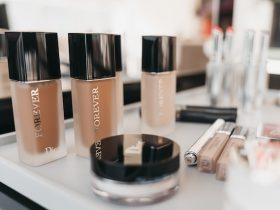1. What is Acne?
Acne is a skin condition that affects millions of people around the world. It is characterized by redness, pimples, blackheads, whiteheads, and in some cases, cysts. Acne can appear on the face, neck, chest, back, shoulders, and even the upper arms. While it is most common in teenagers and young adults, it can affect people of any age.
Although acne can be embarrassing and uncomfortable, there are ways to manage it. One of the best ways to do this is to develop a skincare routine. A skincare routine can help keep your skin healthy, hydrated, and free of acne-causing bacteria.
2. Cleansing
The first step of any good skincare routine is cleansing. Cleansing helps to remove dirt, oil, and bacteria from the skin. For those with acne, it is important to choose a gentle, non-comedogenic cleanser. This means that the cleanser will not clog your pores, which can lead to breakouts. It is best to choose a cleanser that is specifically designed for acne-prone skin.
When washing your face, use lukewarm water and gentle circular motions. Do not scrub your skin, as this can irritate it and lead to further breakouts. For best results, cleanse twice a day, once in the morning and once in the evening.
3. Toning
After cleansing, the next step is toning. Toners help to remove any residue left behind after cleansing and help to restore the skin’s natural pH balance. Toners can also help to reduce the appearance of pores.
When choosing a toner, opt for one that is specifically designed for acne-prone skin. Some toners contain alcohol, which can be drying and irritating to the skin. Avoid these types of toners, as they can make acne worse.
When using a toner, apply it to a cotton pad and gently swipe it over your face. Avoid the eye area as toners can be too harsh for this delicate area. Toners should be used after cleansing and before moisturizing.
4. Spot Treatments
Spot treatments are designed to target and treat individual pimples. They can help to reduce redness and inflammation and help to speed up the healing process. Spot treatments can be applied directly to the affected area.
It is important to choose a spot treatment that is specifically designed for acne-prone skin. Many spot treatments contain benzoyl peroxide, which can be irritating to the skin. For those with sensitive skin, look for a spot treatment that contains salicylic acid, as this is gentler on the skin.
When using a spot treatment, apply a thin layer to the affected area and allow it to absorb into the skin. Spot treatments should be used as needed and in moderation, as overuse can lead to irritation.
5. Exfoliating
Exfoliating is an important part of any skincare routine, but it is especially important for those with acne-prone skin. Exfoliating helps to remove dead skin cells and helps to unclog pores, which can help to reduce breakouts.
When exfoliating, it is important to choose a product that is specifically designed for acne-prone skin. Many exfoliators contain beads or granules, which can be too harsh for sensitive skin. Look for an exfoliator that contains gentle ingredients, such as salicylic acid or lactic acid.
When using an exfoliator, use gentle circular motions and avoid scrubbing the skin. Exfoliate no more than twice a week, as over-exfoliating can lead to irritation and further breakouts.
6. Moisturizing
Moisturizing is an important part of any skincare routine, even for those with acne-prone skin. Moisturizing helps to keep the skin hydrated and helps to prevent further breakouts. When choosing a moisturizer, opt for one that is lightweight and oil-free. This will help to keep the skin hydrated without clogging the pores.
Look for a moisturizer that contains ingredients such as hyaluronic acid, ceramides, and glycerin. These ingredients help to attract and retain moisture in the skin. Avoid moisturizers that contain heavy oils or fragrances, as these can clog the pores and lead to breakouts.
When applying a moisturizer, use gentle circular motions and avoid scrubbing the skin. Moisturize twice a day, once in the morning and once in the evening.
7. Sunscreen
It is important to wear sunscreen every day, even if you have acne-prone skin. Sunscreen helps to protect the skin from the sun’s harmful UV rays and helps to prevent further breakouts. When choosing a sunscreen, opt for one that is non-comedogenic, meaning that it will not clog the pores.
Look for a sunscreen that contains ingredients such as zinc oxide and titanium dioxide, as these are gentler on the skin. Avoid sunscreens that contain heavy oils or fragrances, as these can clog the pores and lead to breakouts.
When applying sunscreen, use a generous amount and reapply every two hours. Sunscreen should be applied after cleansing and before moisturizing.
8. Face Masks
Face masks can be a great way to boost your skincare routine. Face masks help to remove dirt, oil, and bacteria from the skin and help to reduce the appearance of pores. When choosing a face mask, opt for one that is specifically designed for acne-prone skin.
Look for a face mask that contains ingredients such as clay, charcoal, green tea, and tea tree oil. These ingredients help to absorb excess oil, reduce redness and inflammation, and help to prevent further breakouts. Avoid face masks that contain heavy oils or fragrances, as these can clog the pores and lead to breakouts.
When using a face mask, apply a thin layer and leave on for 10 to 15 minutes. Rinse off with lukewarm water and pat dry with a clean towel. Face masks should be used no more than twice a week, as overuse can lead to irritation.
9. Diet and Lifestyle
Diet and lifestyle can have a huge impact on acne. Eating a healthy, balanced diet can help to reduce breakouts and keep your skin healthy. Foods that are rich in antioxidants, omega-3 fatty acids, and vitamins and minerals can help to reduce inflammation and keep the skin healthy.
It is also important to stay hydrated. Drinking plenty of water can help to keep the skin hydrated and help to flush out toxins.
In addition, try to get plenty of sleep and avoid stress. Stress can cause a surge in hormones, which can lead to breakouts. It is also important to avoid touching your face, as this can spread bacteria and lead to breakouts.
10. Conclusion
Acne is a common skin condition that affects millions of people around the world. While it can be embarrassing and uncomfortable, there are ways to manage it. Developing a skincare routine is one of the best ways to keep your skin healthy and free of acne-causing bacteria.
It is important to cleanse, tone, spot treat, exfoliate, moisturize, and wear sunscreen every day. In addition, face masks can be a great way to boost your skincare routine. Finally, eating a healthy, balanced diet and getting plenty of sleep can help to reduce breakouts.
By following a skincare routine and making a few lifestyle changes, you can keep your skin healthy and free of acne.
 Source: www.jtayandlittlea.com
Source: www.jtayandlittlea.com Source: styleandsushi.blogspot.com
Source: styleandsushi.blogspot.com Source: www.thirteenthoughts.com
Source: www.thirteenthoughts.com Source: wedesignweproduce.blogspot.com
Source: wedesignweproduce.blogspot.com Source: www.beautylately.com
Source: www.beautylately.com Source: www.saradujour.me
Source: www.saradujour.me Source: www.livenobs.com
Source: www.livenobs.com



Leave a Reply